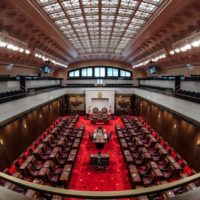
Senate Renewal
More gets done in an independent Senate: Senator Mitchell
The Senate has successfully amended 10 of 44 government bills so far this session, including the transportation bill. More gets done in an independent Senate, writes Senator Grant Mitchell.
This piece by Senator Grant Mitchell was originally published in the Winnipeg Free Press on May 29, 2018.
Few would argue that a recently passed transportation bill benefiting Western grain farmers took a winding and sometimes-convoluted route through the Canadian Senate.
But if you’re a Westerner troubled by the period of time it took to pass this important new law, you might also ask yourself this: Would Senate amendments that will help Western soybean farmers and other grain growers get their crop to market have passed under the previous version of Canada’s upper chamber? My educated guess at an answer is a pretty firm, “No.”
In the two years before the last election, the Senate amended only one of 61 government bills. In the two years since the election, when the government began appointing only Independent Senators, the upper chamber has successfully amended 10 out of 44 government bills, including the recent changes to the Canada Transportation Act.
Bill C-49, a wide-ranging law, which includes improved locomotive safety, marine shipping and provisions for airline passenger rights, among other measures, arrived in the Senate early last November. After five months of review, the Senate sent the bill back to the House with 18 amendments, an almost-unprecedented number. It came back from the House with six amendments accepted – also a large number – and the rest rejected. Then the Senate sent it back yet again, insisting that the House accept two amendments that it had previously refused.
This back-and-forth frustrated some Canadians, many of them Western Canadian grain farmers. Ultimately, on Wednesday of this week, the bill passed after the Senate agreed to accept the elected chamber’s steadfast position on the two rejected amendments.
In the end, the final bill included key Senate changes that will address issues of limited competition in the rail sector and add soybeans to the list of products benefitting from the Maximum Revenue Entitlement. These are significant amendments, given, in particular, the burgeoning soybean industry in Western Canada and the deep importance of rail hauling.
Did the review of this bill take longer than expected? Perhaps. But I’d also venture to guess that most Westerners will believe the improved, amended legislation was worth waiting for. Moreover, it’s my view that the amendments might never have been accepted had it not been for the emergence of an increasingly independent Senate, created by the government’s appointment of only independent senators as well as the government’s openness to Senate suggestions and amendments.
Independent Senators and the independent Senate Liberals are not part of a party caucus and are therefore not subject to party discipline. This is key to being truly independent. Ask a former party-affiliated Senator – like me – if he or she thought about how their Senate behaviour would affect their Commons colleagues before a Senate vote and I think many would say yes. At least I would have.
For my part, I prefer a Senate that is less party-oriented and where amendments have become more commonplace.
That’s a good thing for the regions, for minorities, for the under-represented and for many other groups in Canadian society. But just like taking any new job, the transition is bound to take a little time to get used to – both for Senators and Canadians.





















































